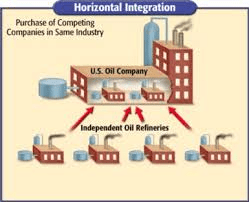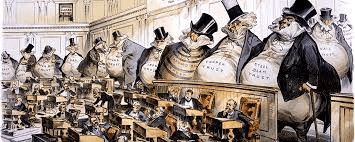This nickname described wealthy business leaders who gained power through monopolies and ruthless tactics.
Robber Barons
What is an example of a “push factor” for immigrants leaving Europe?
famine, persecution, or political instability etc.
Organizations that traded jobs and aid for votes were known as these.
political machines
Overcrowded apartment buildings with poor sanitation were known as what?
tenements
Andrew Carnegie’s “_________” argued that wealthy people had the moral duty to use their fortunes to improve society through philanthropy
“Gospel of Wealth”
What business strategy involves controlling every step of production—from raw materials to finished goods?
Vertical integration
What is an example of a “pull factor” that attracted immigrants to the U.S. during the Gilded Age?
job opportunities, the chance for upward mobility, freedom, etc.
What was the main reason immigrants supported political machines like Tammany Hall?
they provided jobs, housing, and help in exchange for political loyalty
Urbanization can best be describe as?
process of people moving from rural areas to cities, leading to the rapid growth of urban centers during the Gilded Age.
The concept of “________” encouraged immigrants to adopt English, American customs, and civic values to assimilate
“Americanization”
What is it called when one company buys out its competitors to dominate an industry?
Horizontal integration
“New immigrants” primarily came from which regions of Europe and faced greater prejudice?
Southern/Eastern Europe and Asia.
Why was there a need for political machines during the Gilded Age time period?
Cities grew to fast and couldn't support the drastic increase in population due to immigration.
What urban development allowed cities to expand upward rather than outward?
skyscrapers
What type of business organization grew powerful due to laissez-faire policies and lack of regulation
Monopolies
Which economic philosophy supported minimal government interference in business
Laissez-faire capitalism
Where are Angel Island and Ellis Island and how did differ in the immigrant experience?
Angel: Westcoast-San Francisco
Ellis Island: East Coast-New York
longer detention and harsher questioning, especially for Asian immigrants on Angel Island. Easier processing at Ellis.
In Joseph Keppler’s cartoon “Bosses of the Senate,” what does the imagery of massive trusts towering over senators represent?
corporate power dominating government and limiting democracy
Why did ethnic enclaves like Chinatown and Little Italy emerge in major cities?
preserve culture and provide mutual aid among immigrants facing discrimination
During the Gilded Age, many Americans developed this anti-immigrant attitude, believing newcomers threatened their jobs, culture, and politics—leading to movements that pushed for immigration limits.
Nativism
Industrialists like Carnegie and Rockefeller justified wealth inequality using this theory
Social Darwinism (Survival of the Fittest)

The Chinese Exclusion Act of 1882 was significant because it represented this turning point in U.S. policy.
The first major federal law restricting immigration based on nationality
During the Gilded Age, political machines often awarded government contracts to friendly businesses. How did this practice often times lead to fraud?
These contractors would purposely overcharge for projects, kicking back extra money to the machine and its leaders or Political machines gave inflated government contracts to allies who overcharged and shared the profits through kickbacks.
What Social Gospel Organization was created by
Dwight Moody?
YMCA
During the Gilded Age, powerful business leaders like Andrew Carnegie and John D. Rockefeller were often called this term because they built huge companies, created jobs, and helped expand the U.S. economy.
Captains of Industry